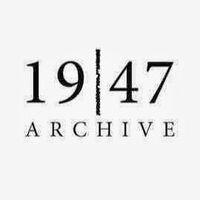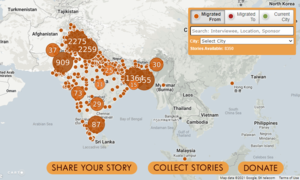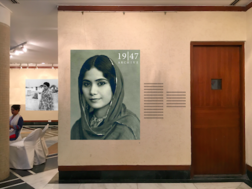Course:ARST575K/LIBR539H/The 1947 Partition Archive
The 1947 Partition Archive ('The Archive') is a organization dedicated to formally establishing the people's history of the Partition of British India, into the two independent states of India and Pakistan. Founded in 2011, The 1947 Partition Archive seeks to document, preserve, and bring awareness of Partition into the "public consciousness", through crowd-sourced oral histories from eye witness accounts from "all ethnic, religious and economic communities affected by Partition in the form of video (and sometimes audio) testimonies"[1].
| The 1947 Partition Archive | |
|---|---|
 | |
| Type | Community Archive |
| Founder | Guneeta Singh Bhalla |
| Established | 2011 |
| Focus | Partition of South Asian states |
| Website | https://www.1947partitionarchive.org/ |
| Location | Virtual (headquarters Berkeley, CA) |
Background and Founding
Founder Guneeta Singh Bhalla grew up in the United States, listening to stories from her grandparents about their escape from Lahore after the creation of India and Pakistan. Despite the forced migration, displacement of upwards of 20 million people, and a death toll ranging from 200,000 to 2 million[2], Bhalla was taught in school that the 1947 independence of India and Pakistan was a fairly uneventful occurrence. In 2008 Bhalla, vacationed to Japan and was inspired by the Hiroshima Peace Memorial , where video recordings of bomb survivors are displayed, describing the horrific ordeal in their own words.
Spurned by the testimonies and lack of widespread knowledge of what Bhalla perceived to be a marginalization of a world changing event, she sought to begin to address this missing history in her community.[3][4] What began as recorded sittings with neighbors, by late 2009, Bhalla was tabling at local mosques, gurdwaras, mandirs, and other cultural events, gathering other passionate volunteers and stories of Partition[3]. Focusing on collecting oral histories, as the number of people with first hand knowledge of Partition dwindled, Bhalla sought to connect the diaspora and to "achieve a new form of agency".[5] Bhalla has commented on the role of the diaspora in the creation of The 1947 Partition Archive, saying, "I was unburdened by the identity politics that are so prevalent and mostly inescapable in South Asia today."[3]
The 1947 Partition incorporated in 2011 with the mission of:
1) Documenting, preserving and sharing eye witness accounts from all ethnic, religious and economic communities affected by the Partition of British India in 1947.
2) Collecting, preserving and sharing personal items and artifacts associated with the people's memory of the 1947 Partition.
3) Bringing knowledge of Partition into widespread public consciousness[1]
Headquartered in Berkeley, California as a registered non-profit, The 1947 Partition Archive is also duly registered as a charitable trust in India. Aside from Bhalla, a core team of "four paid staff members at an office in downtown Berkley, one paid staff member at an office in Delhi"[6] is supported by volunteers, including interns, advisors and subject experts globally.[7]
Collection
Acquisition
The 1947 Partition Archive considers itself a "global digital museum accessible to everyone, everywhere, and built by everyone, everywhere."[1] In line with Flinn, Stevens, and Shepherd's definition of a community archive, The 1947 Partition Archive relies on active participation of the community to determine the reach of documentation and accessibility.[8] In a continued effort to "democratize historical documentation"[1], it uses crowdsourcing and other non-traditional methods to acquire its oral histories and other digital holdings, almost exclusively by volunteers.
Since 2010, nearly 9,500 oral histories have been preserved on digital videos along with 80,000 digital artifacts comprised of family portraits, photographs of significance, and objects from the time of Partition. The oral histories have been collected in over 500 cities by staff, 150+ Story Scholars, and 600+ Citizen Historians.[1]
Collecting Stories and the Interview Process[9][10]
Persons who identify with The Archive's mission are able to reach out directly and request an interview, while at the same time volunteers globally reach out to witnesses of Partition. Once volunteers are matched with an interviewee based on language compatibility, an interview is arranged, focusing on:
- Pre Partition life and background:
- Life, culture and childhood: This allows the listener to build a context for Partition and to better understand how Partition affected one's life, family, community and ways of life.
- Partition:
- Personal observations and experiences. Recall stories of those whom they know and what they experienced. The whole story, what they saw, the good and the bad recalling much detail as possible. How Partition affected them, their family, and their community at the time?
- Post-Partition life
- How did they get to where they are today? Description of their post-Partition life and journey.
- Their feelings about how Partition has impacted their life.
- Thoughts and messages:
- Their thoughts on Partition in general. How they feel about Partition in retrospect? Messages to give to future generations.
Following an interview, permissions are obtained from the interviewee allowing them to choose the extent and on what media their interview can be shared (website, YouTube, promotional material, etc.). The 1947 Partition Archive highlights a common thread in community archives, that the community defines all aspects of their records, including access rights.[4]
Citizen Historian
Those who are passionate about collecting oral histories surrounding Partition can sign up to become a Citizen Historian. Those interested must attend a 2-hour workshop and pass a quiz to qualify for the program. Citizen Historians collect oral histories across the globe by conducting in-person interviews, managing post-interview metadata collection, and online material submission. Citizen Historians are unpaid volunteers, and since the archives' inception have contributed over 150,000 hours of labor towards collecting oral histories.[1]
Story Scholars
The Story Scholars Program is a funded 3-month and 6-month full-time program for individuals with a deep passion for modern South Asian history and storytelling. The program focuses on story collection in a specific geographic and language region across South Asia, though a program centered on the diaspora in California has been held.[11][12] Story Scholars are individuals who have taken part as a Citizen Historian and are currently enrolled in undergraduate or graduate universities. Story Scholars are excepted to carry out the same duties as Citizen Historians as well engage in public outreach, conduct oral history workshops for the public, and meet interview goals (60 collected histories for both 3- and 6-month tracks).[12]
The Story Scholars Program has been funded by the American India Foundation, California Humanities, and Lahore University of Management Sciences.[13]
Access
Public Access

The 1947 Partition Archive's holdings are not readily available to the public. A portion of oral history interviews are freely accessible and hosted on the Stanford University Libraries' Digital Repository and YouTube. Family members of any persons interviewed are able to request access to their relative's records with express permission of the interviewee. Excerpts of collected stories are regularly posted to its Facebook, Instagram, and Twitter.
The website hosts an interactive Story Map that allows the public to interact with some of the derived data aggregates by filtering by an interviewees location prior to Partition, immediately after Partition, and their current residence. The Story Map consists of a portion of the collected oral histories, including summaries by the Story Scholar or Citizen Historian that conducted the interview.
Research Access[14]
The Archive limits access to its holding to academic researchers, museum and collections curators, authors, filmmakers and other educational media makers.[14] Due to the sensitive nature of the records, access to complete collections of oral histories is limited to professional researchers with an institutional affiliation. To gain access to the archival holdings, all interested persons must fill out a 'Material Access Eligibility Form for Researchers' which will determine the eligibility to: 1) oral history interviews, 2) photographic content, or 3) anonymized data aggregates. All access requests are approved on a case-by-case basis based on:
- The importance and relevance of the research topic,
- The seriousness of the research project and,
- The principal investigator's previous work (if a graduate student is conducting first time research, the quality of their advisor's previous work will be judged).
Access to The Archive's holdings is 1) on-site at the global headquarters in Berkeley, California (suspended as of the 2020 COVID-19 pandemic), or 2) paid online web-streaming access.
Beginning in 2020, in partnership with Tata Trusts, The Archive began a grant program for one month immersive research residencies through one of their access partners in India. The residency is open to Indian citizens and permanent residents and provides the researcher with unrestricted access to the holdings.
Programming and Outreach
While the majority of The 1947 Partition Archive's oral history holdings are not public, through programming and outreach The Archive seeks to engage their materials with the public, as individuals continue their own exploration of a still sensitive topic and recognition of such a global event continues to be established.[15] The third part of their mission is to bring widespread knowledge of Partition into the public sphere through:
i) creative and scholarly expression including but not limited to literature, film, theater, visual arts, other creative medium, and academic research
ii) proactive world-wide primary education curricula,
iii) traveling exhibits as well as physical 'Centers for Learning' designed to memorialize the people's history of Partition and serve the public for research and educational purposes.[1]

Events and Speaking Series[16]

The 1947 Partition Archive continues to "bring lived memories to the public"[1] through ongoing public education on their social media, as well as in-person events, exhibitions, workshops, and speaking series.
- Selected Exhibitions
- My Heart Belongs in Delhi and Women During Partition at the Mandi House Metro
- Remembering Partition: Memory Through the Ages at Center for Studies in Violence, Memory and Trauma, Delhi University (CSVMT)
- Voices of Partition (on hold due to COVID-19), global storytelling events featuring academics and Partition witnesses
- Sunday Stories, a weekly live and interactive web-based storytelling series centering on South Asian history, with emphasis on colonialism.
Academic Partners
The Archive has a number of academic partnerships allowing for streamlined research access, as well as providing necessary equipment and space for staff and volunteers.[13]
- Ashoka University - access partner
- Guru Nanak Dev University - access partner
- Habib University - access partner
- Lahore University of Management Sciences - access partner
- Stanford University Libraries - access partner
- University of California Berkeley – videography equipment, meeting space
- University of Delhi - access partner
- University of Illinois, Urbana Champaign - research partner
Partition Library
The Partition Library is currently under construction, upon completion it will be a complete resource of books, film and video, and other web resources. The digital resource center will provide the general public with resources related to Partition history, general South Asian history, notable figures, and other current Partition-related projects and repositories. The library is crowdsourced.[17]
Internships and Apprenticeships[18]
The 1947 Partition Archive Internships & Apprenticeships Program is a robust program centering in five categories. The Archive relies on volunteer support in all areas of the organization to carry out program deliverables as well as day-to-day organizational management.
- Oral History Program
- Digital Archivist
- Copy Editor
- GIS Tagging and online mapping/ Story Map curation
- Community Relations
- Digital Media Storytelling, Writing, and Publishing
- Digital Storytelling, Content Curation, Copy Writing
- Digital Graphics Editor - Photo and/or Video.
- Social Media and Digital Outreach Researcher
- Online Broadcasting
- Live Switch-Boarding and Online Broadcasting
- Events Researcher
- Event and Conference Organizing
- Non-Profit Development and Fundraising
- Grants Writing
- Non-Profit Accounting and Bookkeeping
- Donor Communications
- Donations Accounting and Sponsor Matching
- Online Librarian
- Data Visualization
Conclusion
The 1947 Partition Archive is deeply entrenched in the participatory nature of community archives - from formation, to collection, to preservation, to programming - The Archive is at every step concerned with involvement of the self-defined community.[19] The Archive has expanded the notion of outreach and programming, as the act of story collection itself, is considered a means of community engagement on both sides of the practice - as interviewer and interviewee. The 1947 Partition Archive is devoted to "serving witnesses and to creating a more empathetic world"[1] through its democratized acquisition practices, and community and volunteer driven work model. As Lidia Curti posits, "...this new archive, with its possibility for interactive users to enter, edit and contribute, is for migrants a place of debate, a tool of everyday life, a break between memory and desire."[20]
References
- ↑ 1.0 1.1 1.2 1.3 1.4 1.5 1.6 1.7 1.8 The 1947 Partition Archive. "Mission & Activities".
- ↑ Talbot, Ian; Singh, Gurharpal (2009). The Partition of India. Cambridge University Press. ISBN 978-0-521-85661-4.
- ↑ 3.0 3.1 3.2 Bhalla, Guneeta Singh (August 11, 2020). "How Being Part of the Diaspora Helped me Build the Largest Oral History Archive of South Asian History". Indiaspora.
- ↑ 4.0 4.1 Caswell, Michelle; Migoni, Alda Allina; Geraci, Noah; Cifor, Marika (2017). "'To Be Able to Imagine Otherwise': Community Archives and the Importance of Representation". Archives and Records. 38 (1): 5–26.
- ↑ Tai, Jessica; Zavala, Jimmy; Gabiola, Joyce; Brilmyer, Gracen; Caswell, Michelle (2019). "Summoning the Ghosts: Records as Agents in Community Archives". Journal of Contemporary Archival Studies. 6. line feed character in
|title=at position 43 (help) - ↑ Enjeti, Anjali (May 4, 2016). "One Woman's Quest to Record the History of the 1947 Partition of India and Pakistan". NBC News.
- ↑ The 1947 Partition Archive. "ABOUT US".
- ↑ Flinn, Andrew; Stevens, Mary; Shepherd, Elizabeth. "Whose memories, whose archives? Independent community archives, autonomy and the mainstream". Archival Science. 9 (1-2): 71–86.
- ↑ The 1947 Partition Archive. "THE INTERVIEW PROCESS".
- ↑ The 1947 Partition Archive. "THE QUESTIONS".
- ↑ The 1947 Partition Archive. "SUMMER INTERNSHIP: CALIFORNIA STORY SCHOLARS PROGRAM - CLOSED".
- ↑ 12.0 12.1 The 1947 Partition Archive. "APPLICATION: STORY SCHOLARS PROGRAM".
- ↑ 13.0 13.1 The 1947 Partition Archive. "PARTNERS".
- ↑ 14.0 14.1 The 1947 Partition Archive. "REQUEST FOR ARCHIVE ACCESSIBILITY AND USE".
- ↑ Cifor, Marika; Caswell, Michelle; Migoni, Alda Allina; Geraci, Noah (May 2018). "What We Do Crosses Over to Activism': The Politics and Practice of Community Archives". The Public Historian. 40 (2): 69-95. doi:10.1525/tph.2018.40.2.69.
- ↑ The 1947 Partition Archive. "EVENTS & EXHIBITIONS".
- ↑ The 1947 Partition Archive. "PARTITION LIBRARY".
- ↑ The 1947 Partition Archive. "INTERNSHIPS & APPRENTICESHIPS".
- ↑ Zavala, Jimmy; Migoni, Alda Allina; Caswell, Michelle; Geraci, Noah; Cifor, Marika (2017). "'A Process Where We're All at the Table': Community Archives Challenging Dominant Modes of Archival
Practice". Archives and Manuscripts. 45: 202–215. line feed character in
|title=at position 100 (help) - ↑ Curti, Lidia (2012), “Beyond White Walls,” in Ferrara, Beatrice (ed.). Cultural Memory, Migrating Modernities and Museum. Milan: Politecnico di Milano, 193.